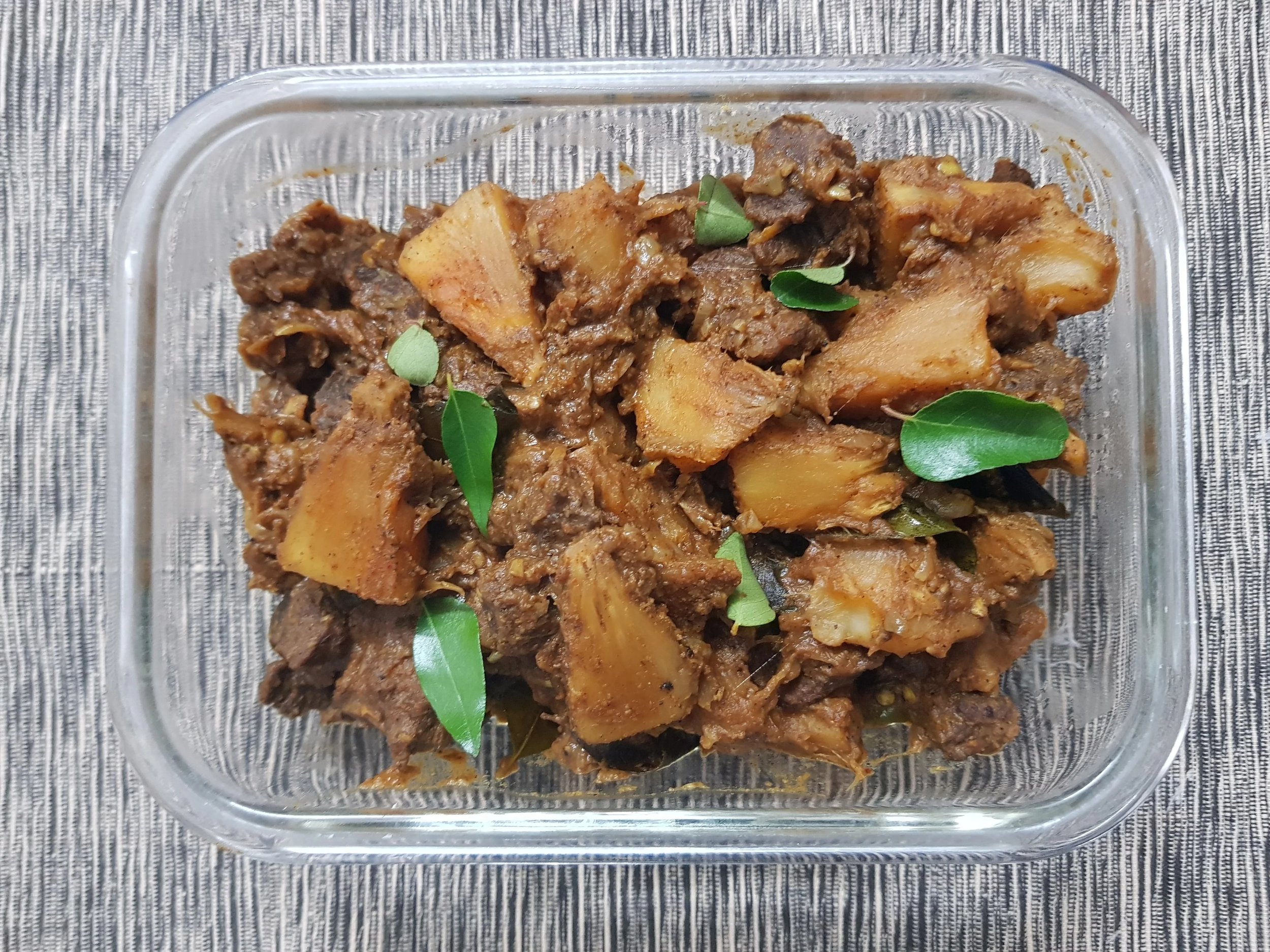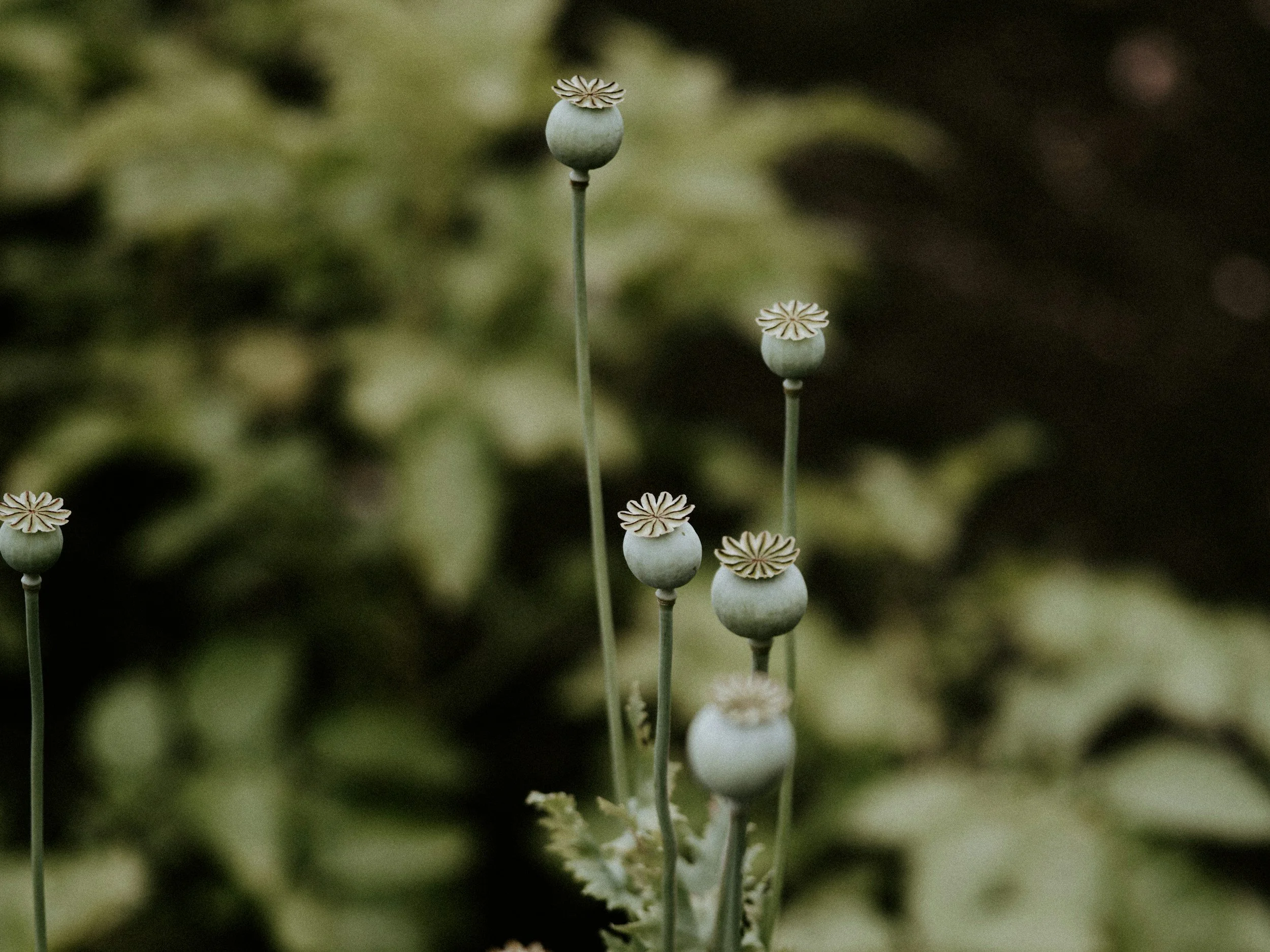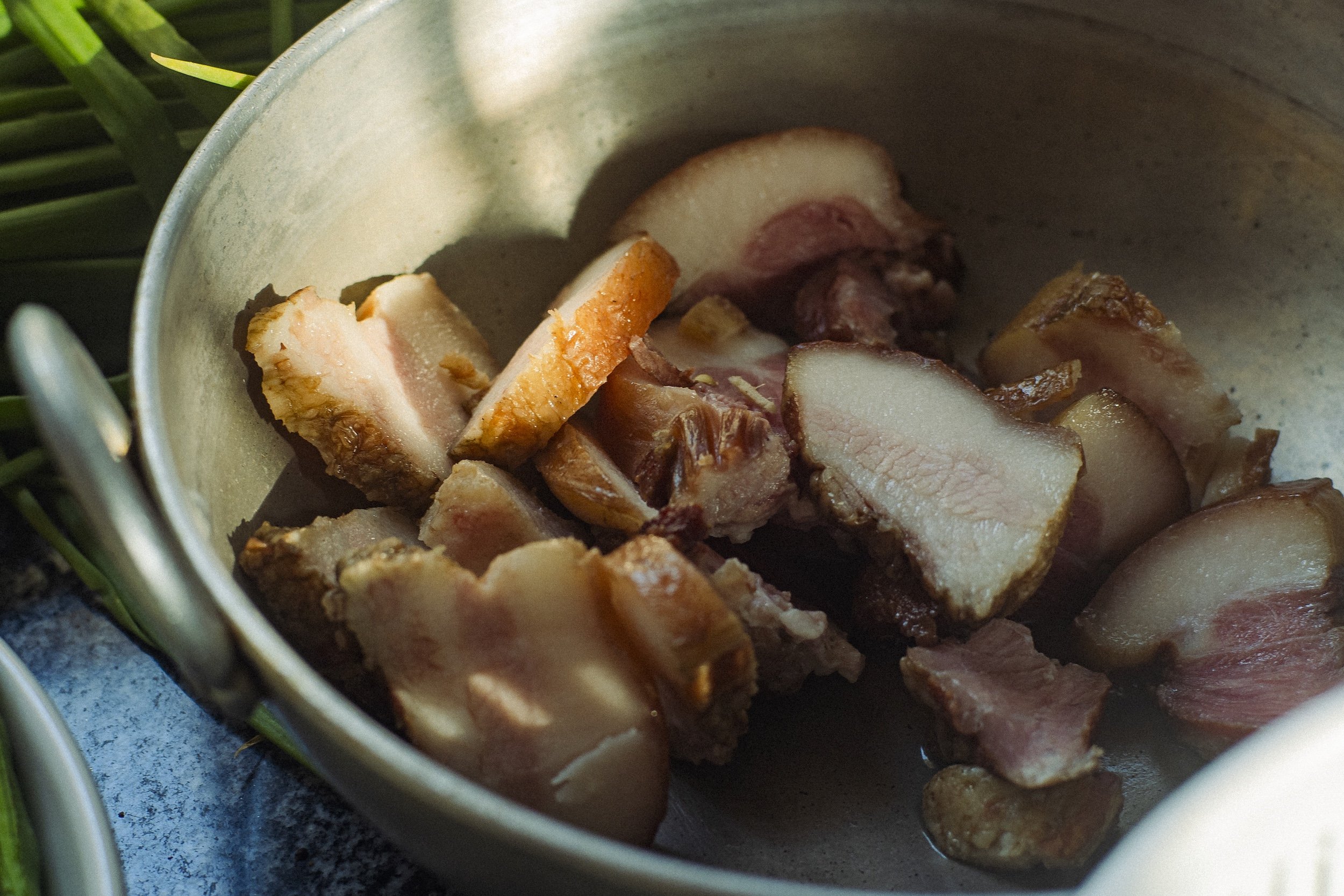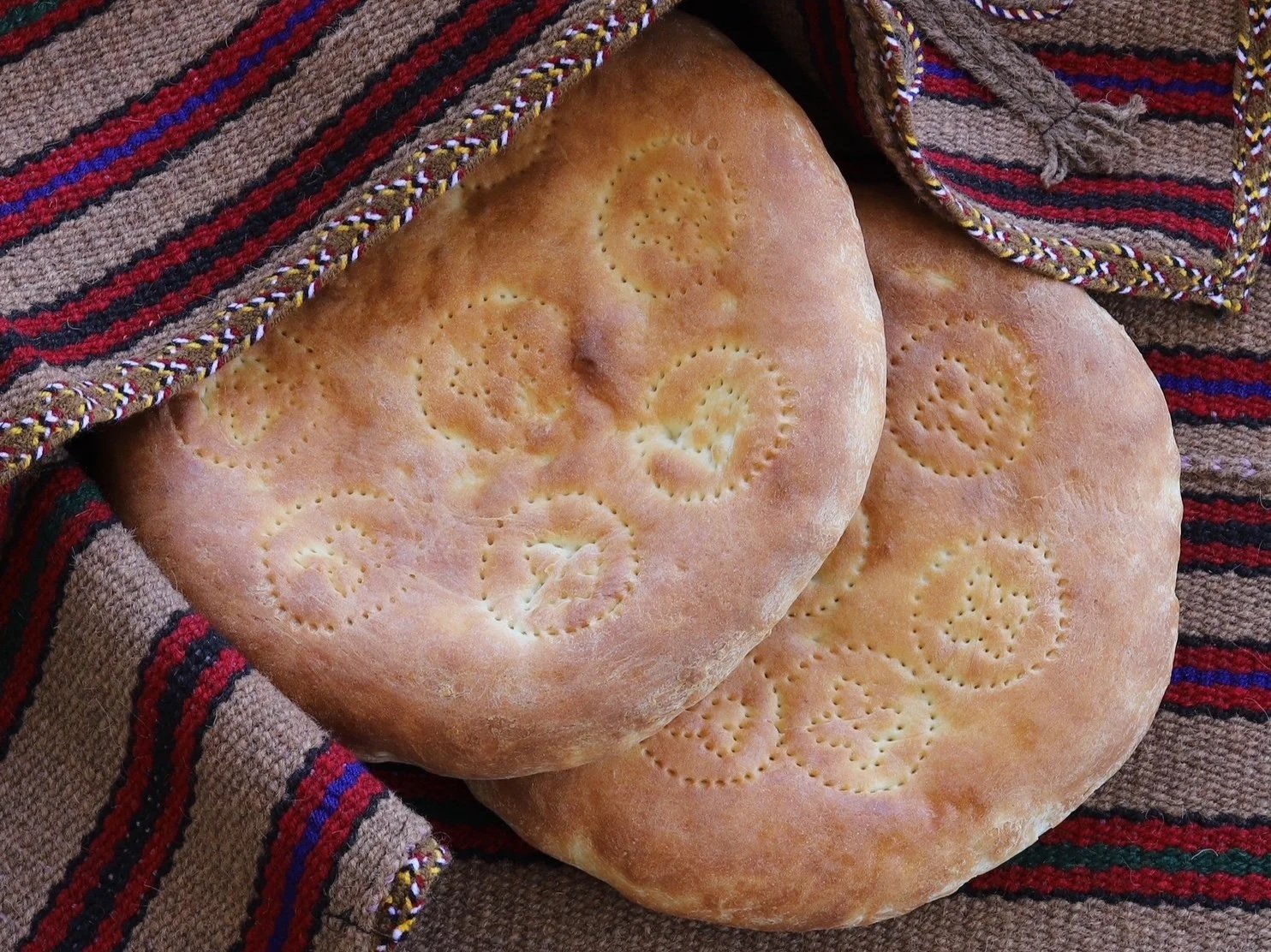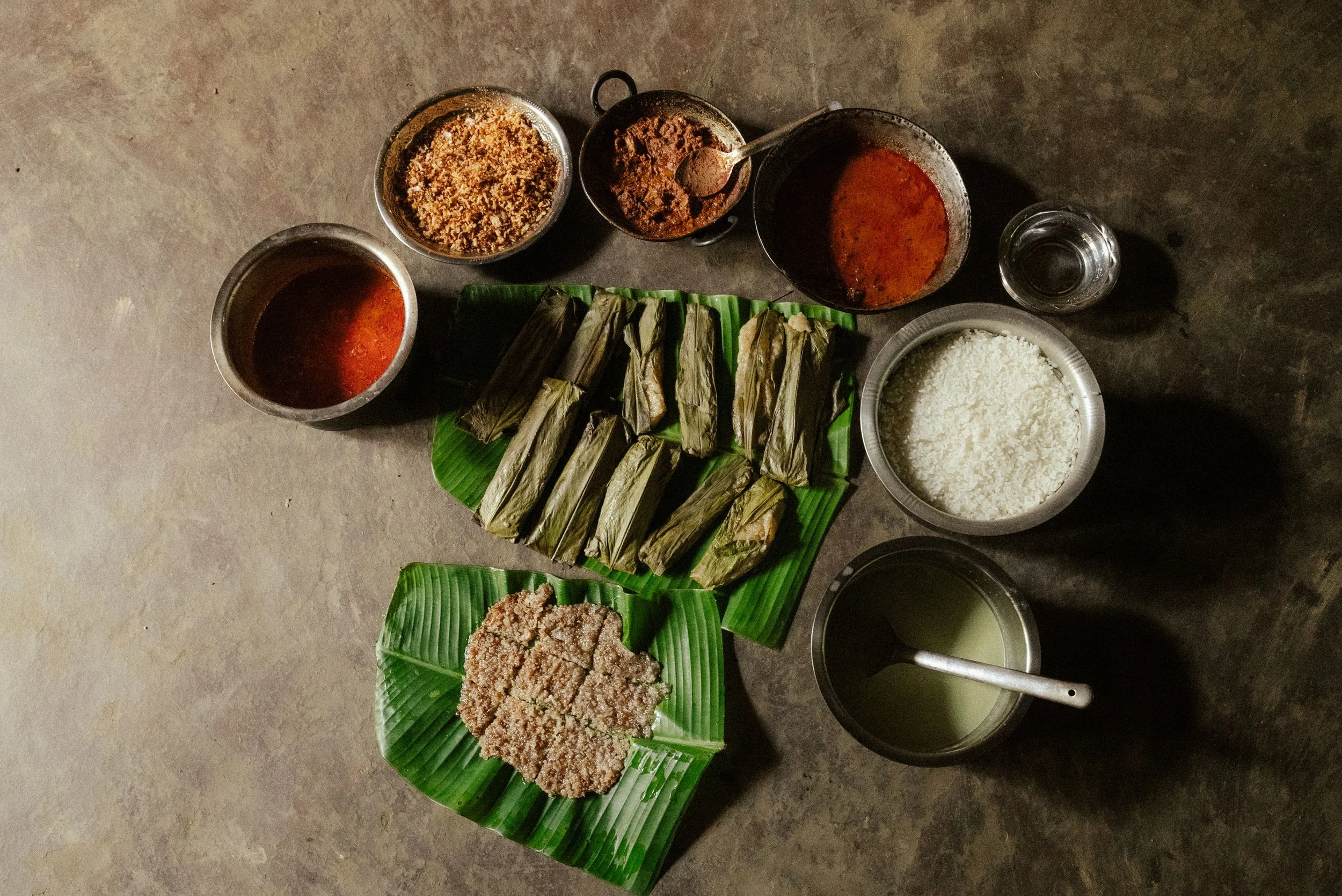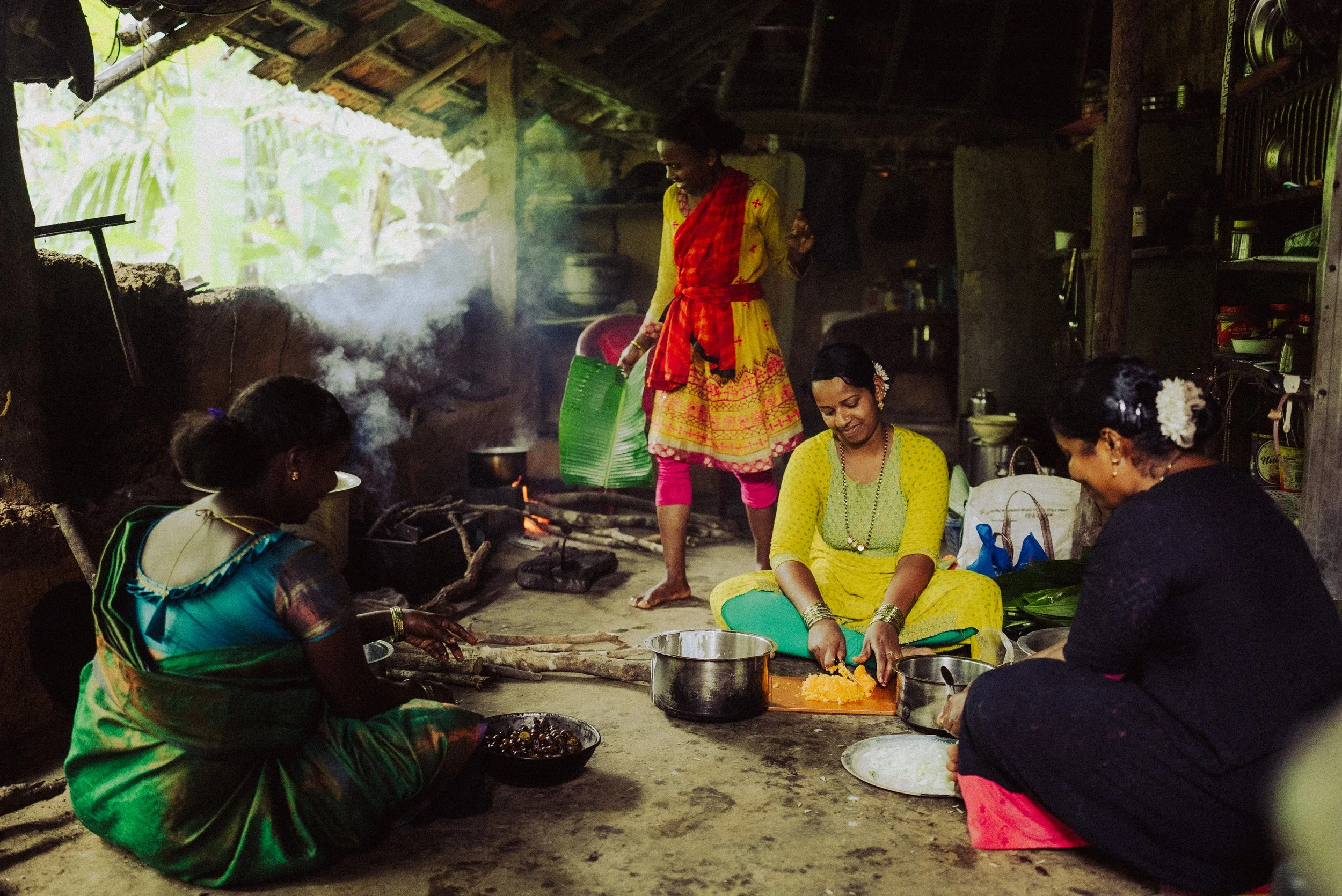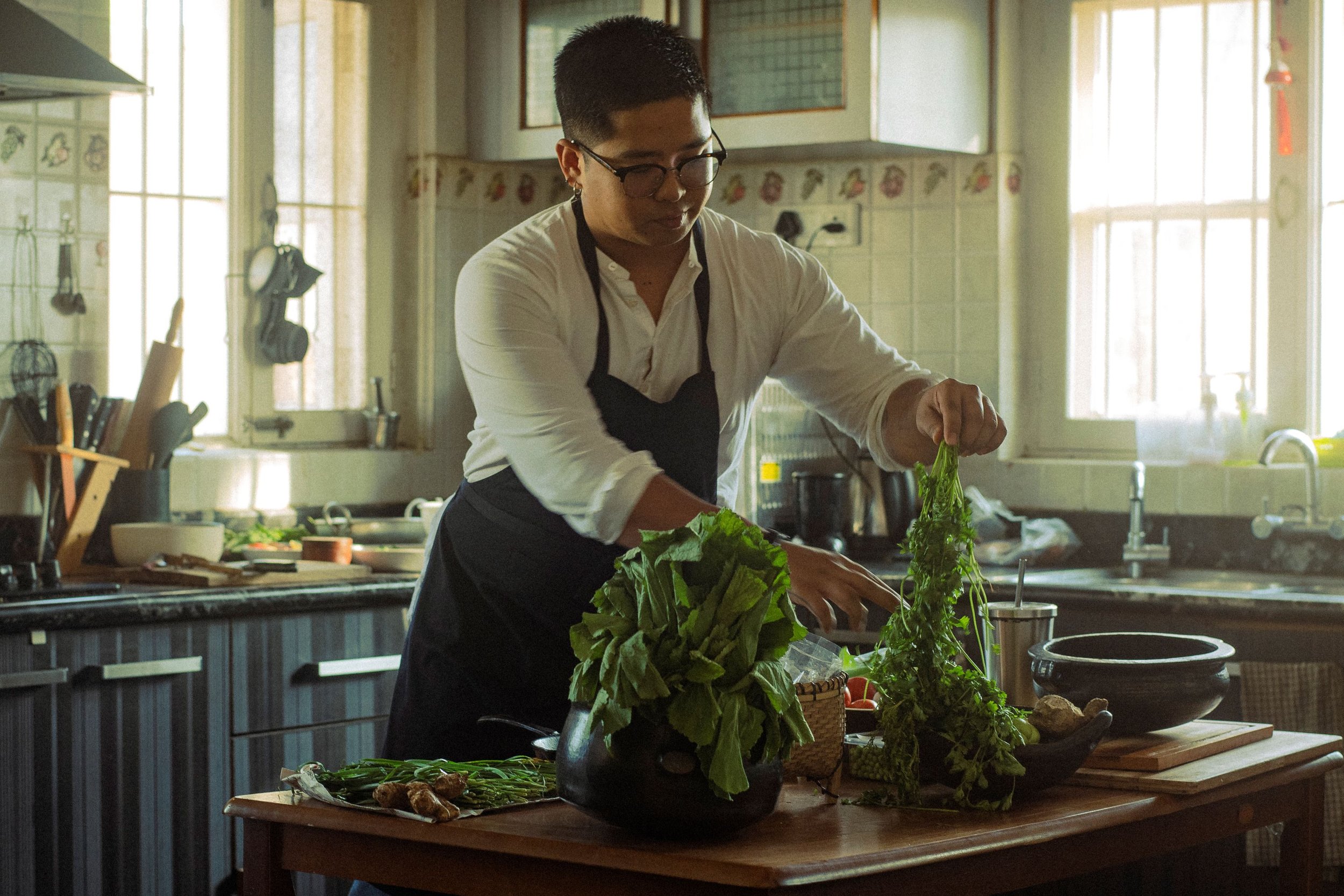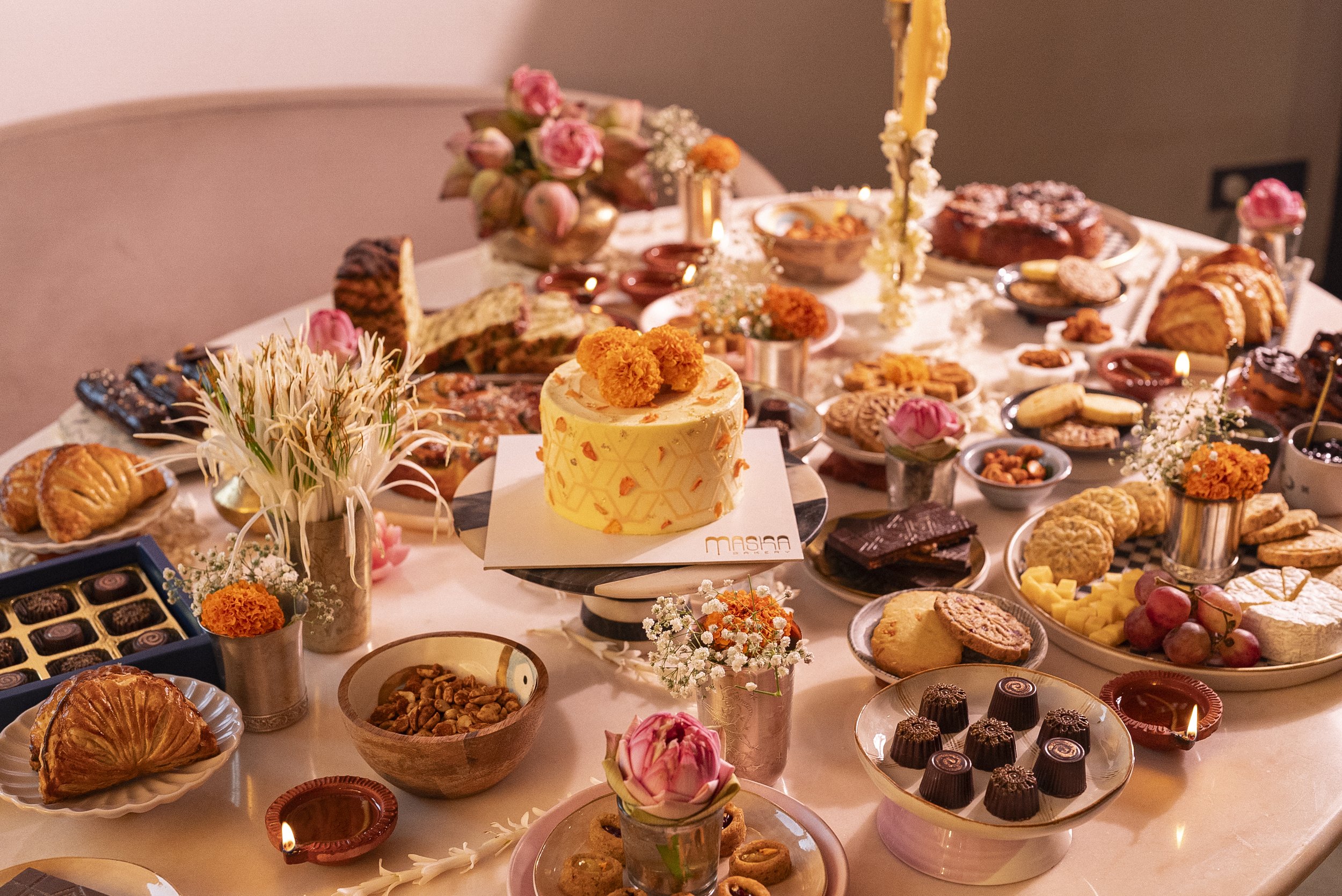Home Cooks & Small Kitchens Keep Culinary Tradition Alive in Palestine

Despite the political complexity of life in Palestine, Zuri Camille de Souza finds its food culture thriving. Contemporary culinary practices are interwoven with the deep heritage of this ancient land, kept alive in homes, kitchens, markets and restaurants.
I returned to Jericho after two long years, on the invitation of the el-Atlal residency program. My project explores how contemporary food practises and access to land are interwoven with culinary heritage. The last time I was here, it was to research agricultural initiatives within the occupied territory, from permaculture projects to large-scale date farms and a historic dairy cooperative. I now wanted to spend time with people in their kitchens and homes, learning about how daily life — and the way people eat — is defined by the complex politics of Palestine.
Much has changed — I am greeted by a massive KFC at the entrance to the city, as I drive to the guest house. Fitting, I think to myself, given the theme of my research.
Nestled between the Mount of Temptation and the Jordan Valley, the oasis of Jericho is known for its agricultural abundance — most notably, citrus, dates and vegetables, cultivated for sale in the West Bank (and those grown in illegal settlements), are exported all the way to Europe. Food, in this part of the Jordan Valley, is inherently woven into the complex and unequal resource politics, in favour of Israeli occupation. Palestinian farmers and nomadic Bedouin communities are denied access to aquifers, or banned from sinking borewells; their herding routes are blocked and fertile land is encroached by Israeli settlers, leaving them no choice but to work on illegal Israeli settlement farms or find work elsewhere.
From discriminatory land-use policies to unplanned development, one wonders how local culinary tradition might survive within such a challenging environment. However, within people’s homes in Jericho, and certainly other parts of Palestine, food is as symbolic as it is necessary. History is embedded within culinary tradition in a country that is constantly under threat of erasure in the name of occupation. Gardens, the act of foraging, the sharing of recipes and communal meals, are powerful testament to the stories of nourishing and cultivating that these lands contain.
That evening, I am introduced to Rukaiya by my friend, Celeste. Of Nigerian descent, Rukaiya’s mother’s family came to Jerusalem as pilgrims, then settled in Jericho. Charismatic and energetic, with a youthful laugh, she runs youth leadership programs in Jericho, and takes great pleasure in helping people get things done. We are at her house for tea, with her sister and mother. It is windy and dark in their courtyard — the sun sets early in the desert— and a resplendent crescent moon greets us through the leaves of a lush ficus tree. In front of us is a plate of arwa — small homely parcels of dough, stuffed with wilted spinach, sumac and minced onions. We sip on an aromatic herbal infusion as her mother, a tall, silent woman in her late sixties, smokes a shisha beside us, speaking only to insist that we fill our plates. I tell Rukaiya about my project, and she promises to put me in touch with Khowla, her colleague who will have more information to share.
Fresh produce at a local market
A myriad varieties of olives in the market
I am instantly curious when Khowla walks into the room. A woman in her late fifties, she has the hands of someone who works hard — creased and strong, but elegant. She doesn’t speak a word of English, and my Arabic is basic. But the wide, joyous smile she greets me with instantly puts me at ease. More with gestures than words, she tells me to meet her at 7 AM the following morning. Khowla runs the canteen for the secondary school in Jericho, and a catering service for the YWCA. I have been invited to cook with her over the next few days, to learn about vernacular Palestinian cuisine.
It is already bright when I set out for the school the next day. The sun burns down on the stone walls of the city. I am greeted by Reem, Khowla’s assistant, who is learning English by watching TV, and says ‘Oh my God’ with an impeccable American accent every so often. She makes me a cup of sweet black tea infused with sage, the staple breakfast brew in Jericho. Khowla, through Reem’s translations, lists out the menu and tasks for the day. We are preparing a catering order — appetisers, rice, meat, and kibbeh. Khowla’s demeanour in the kitchen is relaxed, but she works deftly, setting the grill with pieces of meat seasoned with cardamom powder for the oozi, a Palestinian rice dish seasoned with aromatic spices, caramelised onions, and cooked in a flavourful meat broth. As the rice cooks, filling the room with its perfume, we begin making Kibbeh, hollow bulgur shells filled with minced meat and pine-nuts, fried golden in butter. The simple oval form of the kibbeh hides the finesse required to sculpt the soggy bulgur into delicate pointed shells, filling and then sealing, before frying. Khowla cradles the bulgur in the crook of her palm while using an index finger dipped in oil to smooth out its form. She insists that the trick is to use just the right amount of oil, or the bulgur can crack. Reem and I don’t get that far, and spend our time rolling soft dough into small circles that we top with tomato, onions and meat, all flavoured with fresh zaatar and a touch of paprika. At lunch time, Reem insists on getting us a bite from her favourite stall, and comes back with littles tubs of hummus, freshly-fried falafal and msabaha — like hummus but better, with whole chickpeas folded into a creamy, lemony, garlicky tahini topped with parsley. The falafel is crunchy and brown on the outside, and steaming, speckled green on the inside, burning our fingers as we break it into two. Our conversations revolve around why I am here, whether I am married, and what I like to eat. Reem loves to sing, and alternates between Jordanian pop and old Bollywood songs. The day is long and fruitful. We make promises to meet for tea soon.
“You should meet my mother — she loves plants, and she is an incredible cook!” At the guesthouse, Tariq, the manager, insists that I come to his house for breakfast. I tell him about my day cooking with Khowla and he insists that no one is a better cook than his mother. Despite my enthusiasm, I hesitate. His mother works at Nakheel, a large industrial date producer that has a processing unit not too far away. Having been to the factory and seen the meticulous work involved in manually separating towering mounds of dates, I don’t want to bother Um Tariq on her day off. But he persists, and I say yes.
Walking along the sandy path to his house, in time for breakfast the next day, we pass several orange and lemon orchards, Jericho’s most prized produce after dates. Tariq lives with his parents and two younger sisters. Um Tariq is soft and discrete, but warm and welcoming, happy to walk us around the courtyard, showing us her plants. Purslane grows wild here, as does rosemary and spicy basil; they have citrus trees and goats, and his father is in the midst of planting green pepper.
As we drink coffee from tiny porcelain cups in the kitchen, Um Tariq brings out avocados, eggs, tomatoes, and lemons from the garden. She gathers a can of ful (cooked fava beans), a jar of tahini, some sumac, black olives and fresh parsley. She heats up the ful in a little pan and then, using a bright orange plastic mortar and pestle, grinds them into a creamy paste with tahini, which she then smoothes into a plate. Making a small well in the beans, with the back of a spoon, she pours in lemon juice blended with finely-chopped garlic, green chilli and salt. Fresh, flavourful and healthy, the beans are perfect for breakfast on a busy day. We peel and cream the avocados; I am reminded of a dear friend who says his grandfather planted the first avocado tree in Palestine. Tariq’s mother remembers having avocados in Jericho when she moved here from Jordan, after her wedding, almost 20 years ago. She likes them seasoned simply, with lemon, olive oil from this year’s harvest, and parsley. The eggs are scrambled with cumin, red chilli powder, minced onions and diced tomatoes, making me nostalgic for the anda-pav that I have not eaten in two years.
Lunch in Um Tariq’s home
We bring everything out of the kitchen into a sunlit dining room, decorated with photos of her husband, plastic-wrapped toys, an old wooden coffee grinder, and lace sofa covers. We place the dishes onto a round table beside a basket of wholewheat taboon bread and two small plates of fresh labneh and hummus, generously bathed in deep green olive oil. We tear off pieces of bread, to dip into the fresh avocado, the delightfully garlicky ful, and soothing labneh. There is an unspoken courtesy and natural rhythm to eating from common plates as near-strangers, a beautiful act that calls for an awareness of how those beside us eat.
Throughout my project, I find my way into homes and kitchens — crying over onions, kneading dough, awkwardly trying to remember Bollywood films from the sixties (because Palestinians do love a good Hindi film). As I ride out from Jericho to Ramallah, I realise that I’m not sure if I invited myself over, or if Ziad insisted that I cook with his grandmother; nevertheless, I am thrilled to learn how to roll maftoul by hand. The journey to his village takes two hours and two taxis, from the busy crowded capital to the silent, cool hills on its periphery. It isn’t too far away, but Palestinian public transport is banned from using Israeli highways, and we have to take circuitous, inconvenient routes. We arrive with bags of aubergines, tomatoes, two chickens and three bottles of Coca Cola. His grandmother greets us from the patio of a big stone house surrounded by mint and thyme.
Making maftoul is a long and laborious process that merits company, several glasses of tea and patience. Unlike regular couscous, the grains are thick and solid, and the manner in which they are rolled determines whether they turn into fine beads or ungainly lumps. Beginning with a small mound of pre-soaked bulgur in the centre of a large aluminium plate, Ziad’s grandmother sprinkles freshly-milled wheat flour onto the grains, skilfully coating each morsel with quick circular movements of her hand. Every so often, she adds some water and then some flour. The tiny beads pile up, and soon she has filled a plate. As she lays it to steam over a large pot of boiling water, I begin a second round, realising very soon that the slightest pressure deforms the bulgur into a homogenous mess. Holding her hands wide apart, she tells me to let the grains roll between my fingers as I move them through the mix. As we steam the second batch of Maftoul, I realise three hours have passed. We set a casserole on the stove, simmering with chickpeas, onions and tomatoes in a sweet and spicy broth; there is chicken rubbed with sumac and olive oil grilling in a wood-fired oven outside — an oven once used to bake bread on the daily, for Ziad’s family. The maftoul has finished steaming, and we pour broth over the chestnut-hued beads, each one a labour of love that Ziad’s grandmother has poured her infinite patience into. Then, golden pieces of chicken are arranged onto two towering piles of maftoul that we carry to the table, along with Coca Cola and freshly-preserved olives, harvested from the old tree in the garden. Succulent and comforting, the acidity of sumac brings out the flavours of cumin and tomato, and the smoky chicken is tender and perfectly-grilled. The meal is enjoyed in happy and warm silence, the sort that falls only when great meals are served.
Freshly-made maftoul
The author making maftoul with Ziad’s grandmother
The following day, I make my way to Bethlehem to cook with Palestinian chef, Fadi Kattan. Working at the cusp of contemporary Palestinian food and culinary heritage, Fadi brings regional specialities into dialogue with new techniques and creative flavour pairings. Passionate about where his produce comes from, Chef Fadi invites me to explore the market before heading to cook. Our first stop is his butcher, the oldest in the city, as an engraving on the wall proudly cites. Strings of freshly-made merguez hang from the wall; offal and undercut are placed between fresh bunches of parsley; the butchers are delighted to see him. He chooses a fresh piece of liver and asks the butcher to prepare his special: finely-sliced, with olive oil and lemon. Insisting that this is tradition, we begin our day with raw liver marinated in citrus, followed by strong Arabic coffee. I leave with a big stain of olive oil on my sweater, and the discovery of new flavours. Our next stop is an old lady surrounded by sheets of Malban (quince fruit leather) on blue plastic sheets, fresh herbs, sweet peas, purple aubergines and spinach. As she smiles, her gold teeth shine. Chef Fadi introduces me to Um Nabil who supplies him with greens, special vegetables and local produce. After a long chat, we sample her malban; it crunches with black pine seeds. We also buy a kilo of fresh peas. Then, at the bakers, we pick up a stack of Taboon bread. The air is smokey and warm, the bread soft and comforting; its coarse floury crust singes our fingers as we tear at it. On the way back, we pass a man selling semolina cakes on the narrow stone path. Soaked in sugar syrup, they are flavoured with fenugreek seeds and subtle spice blends. Cooking with Chef Fadi, his sous-chefs Fateen and Nasrin, is amusing and joyous. Our dinner menu is fresh and flavourful — laban jameed and a cream of green peas dip; crisp freekeh arancini with a parsley sauce, and pulled lamb-necks that we slow-cooked in laurel leaves and aromatic herbs all afternoon, served on whole Swiss chard leaves grilled in the oven. But it is dessert that surprises me most — almonds, pine-nuts, sprigs of rosemary, and rosewater, cooked together in a simple syrup and topped onto tiny, succulent eggplants grilled until fondant-like in the oven. After three days of cooking at Fawda, I leave grateful, inspired and curious.
Food nourishes our bodies but it is also a thing of deep comfort and memory, reassuring us with the familiarity of well-loved dishes; exciting us with new tastes and calling for us to share moments of joy with others. While the Israeli occupation of Palestine renders daily life challenging, both physically and emotionally, each meal in the month I spent in Jericho resonated with generosity and pride, with flavours as rich and vibrant as the stories that came with them. I brought back a kilo of za’atar, dried rose petals and dates. When I share this with friends, I find myself re-telling stories of balmy evenings in Jericho, the market in Bethlehem, and the countless kitchens and dinner-tables that I was welcomed at. I left Palestine with gratitude for the people that I met, for it is only through their positivity, strength and creativity that food culture in Palestine thrives.
Zuri Camille de Souza is a spatial designer and writer. She works on themes of ethnobotany, architecture, food and the geopolitics of the city. You can find more of her work here.
ALSO ON THE GOYA JOURNAL


